Natural Ways to Unclog Your Shower Drain
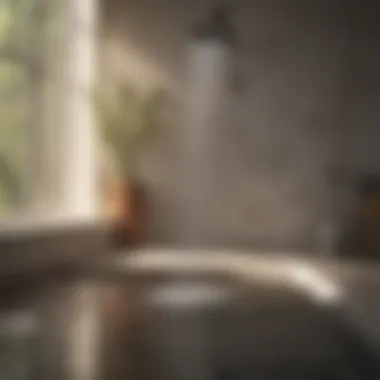
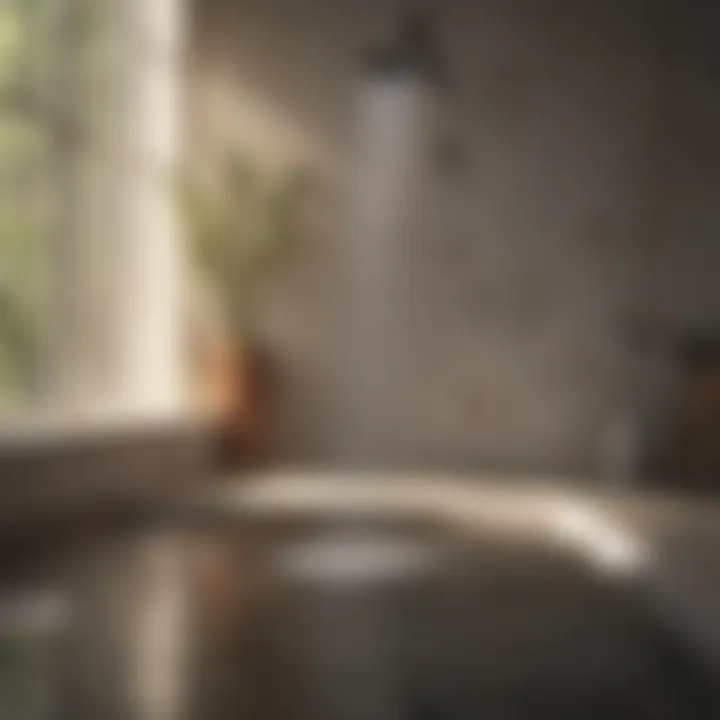
Intro
Dealing with a clogged shower drain can be a frustrating experience for any homeowner. Knowing how to unclog it naturally adds to the convenience. This guide aims to provide a thorough overview of methods and techniques that utilize simple, eco-friendly materials. In doing so, readers can avoid harsh chemicals that may damage their plumbing or the environment.
Several factors contribute to shower clogs, such as hair accumulation, soap scum, and debris buildup. Understanding these causes will aid in finding effective remedies. We’ll explore various natural solutions that are easy to implement, saving time and money while ensuring a clean environment.
Understanding the Causes of Clogs
Before diving into solutions, it's important to recognize the culprits behind clogged shower drains. The most common causes include:
- Hair: A leading cause of blockages, hair strands tend to tangle and catch on existing debris.
- Soap Scum: Soap residue can build up over time, making it difficult for water to flow freely.
- Mineral Deposits: Hard water can leave behind mineral buildup, clinging to the inner pipes.
Understanding these causes helps in devising practical strategies for regular maintenance and cleaning.
Natural Remedies for Unclogging Shower Drains
Here are some effective natural remedies you can try:
- Baking Soda and Vinegar:
- Salt and Baking Soda:
- Boiling Water:
- Wet/Dry Vacuum:
- Manual Removal:
- Pour half a cup of baking soda down the drain, followed by half a cup of vinegar.
- Let it sit for at least 30 minutes, then flush with hot water.
- Mix a quarter cup of salt and a quarter cup of baking soda and pour it down the drain.
- Follow with hot water after about 15 minutes.
- Simply boil a pot of water and carefully pour it down the drain in stages. This can help dissolve any grease buildup.
- If available, a wet/dry vacuum can be powerful for sucking out clogs directly.
- If possible, remove the drain cover and carefully pull out visible hair and debris.
Using these methods allows homeowners to address clogged drains without the detrimental impacts of chemical cleaners.
Preventative Measures
Maintaining clear drains requires consistent effort. Here are some preventative strategies:
- Install a drain cover to catch hair and larger debris.
- Rinse the drain regularly with hot water and vinegar to prevent soap scum buildup.
- Avoid pouring grease or thick substances down the drain.
By employing these strategies, uncovering and outputting solutions becomes part of regular home maintenance rather than a reactionary measure.
Regular maintenance of your shower drain can save you time and money in the long run. Don't wait for the clog to occur before taking action.
This guide illustrates that keeping shower drains clear is not overly complicated. With attention to natural methods and consistent preventative measures, a clean and smooth-running shower is achievable.
Intro to Shower Drain Clogs
Understanding the topic of shower drain clogs is crucial for homeowners. Clogs can disrupt daily routines and lead to larger plumbing issues if not addressed promptly. This article provides a comprehensive guide aiming to inform readers about the natural methods for unclogging showers. Throughout this journey, we'll uncover common causes, effective remedies, and tips for prevention. By maintaining clear drains, homeowners enhance their living environments and prevent costly repairs down the line.
Understanding Clogs in Shower Drains
Clogs develop in shower drains primarily due to the accumulation of hair, soap scum, and other debris. Over time, these materials build up, leading to partial or complete blockages. Hair is often the most significant contributor, as it easily intertwines with soap residue, forming a dense mass that is difficult to remove. Understanding this process is essential for anyone seeking to tackle the problem effectively.
Common Causes of Shower Drain Clogs
Several factors contribute to shower drain clogs. The most prevalent include:
- Hair: As mentioned, hair combined with soap creates a formidable obstruction.
- Soap Scum: Hard water can lead to mineral deposits that combine with soap, building a sticky residue.
- Foreign Objects: Items like razors or sponges can accidentally fall into the drain, causing blockages.
- Tree Roots: In some cases, roots from outdoor trees can infiltrate plumbing lines and create significant issues.
These elements highlight the importance of regular maintenance to avoid the inconvenience of clogged drains.
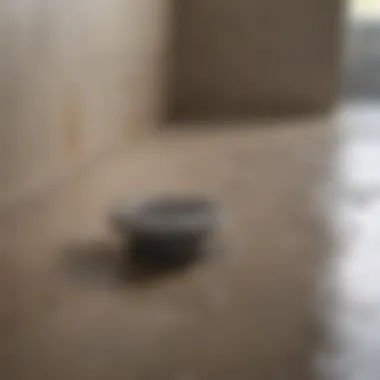
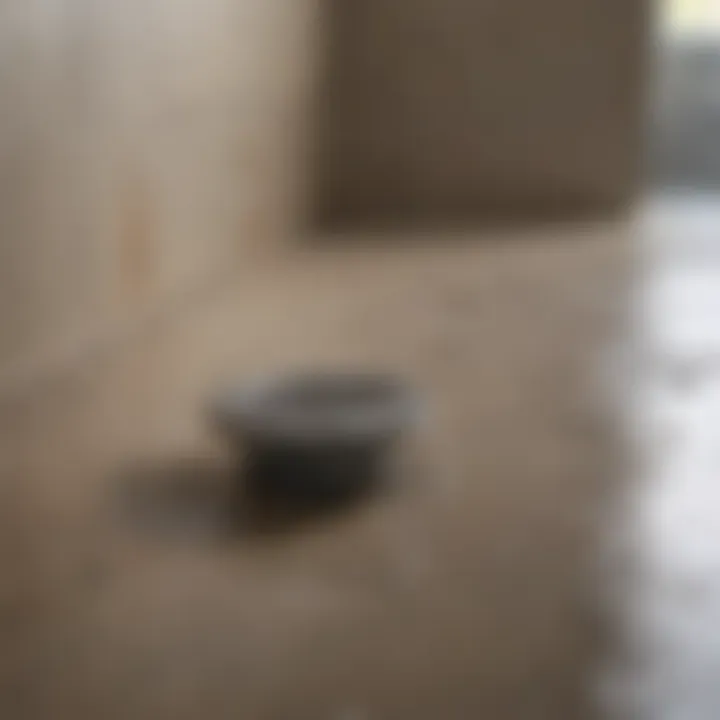
Impacts of Clogged Drains on Home Maintenance
Clogged drains can have far-reaching effects on home maintenance. Initially, they present an annoyance, inhibiting proper water flow. However, unresolved clogs can lead to more severe plumbing issues, which often require professional intervention.
- Water Damage: If water backs up due to a clog, it can lead to unsightly and damaging leaks.
- Unpleasant Odors: Standing water due to clogs can create unpleasant smells in bathrooms.
- Increased Repair Costs: Ignoring minor clogs may lead to larger plumbing disasters, which can be costly to fix.
To maintain home functionality, it is essential to recognize the signs of clogs and act swiftly.
"Regular maintenance can save homeowners time and money, preserving household comfort and safety."
Natural Remedies for Unclogging Shower Drains
Clogged shower drains can be a nuisance, disrupting your daily routine and creating inconvenient situations. The importance of natural remedies lies in their ability to resolve these issues without relying on harsh chemicals, which can harm both the environment and your plumbing. Natural solutions tend to be safer for your health, cost-effective, and relatively easy to implement. People are becoming increasingly aware of eco-friendly practices, making the exploration of natural remedies quite relevant and necessary.
In this section, we will delve deeper into effective methods for unclogging shower drains naturally. Each technique has its distinctive advantages, making it essential to choose the right one based on the nature of the clog and the materials present in your plumbing.
Boiling Water Technique
Boiling water is one of the simplest methods available for unclogging a shower drain. It works effectively for minor clogs, particularly those caused by soap scum and hair buildup. The high temperature of the water helps to dissolve soap residue, fats, and other organic debris.
To use this method:
- Boil a kettle or large pot of water.
- Carefully pour the boiling water directly into the drain in stages.
- Wait a few moments after each pour to observe if the water is draining effectively.
This process can be repeated several times if the clog persists. Always ensure to use caution when handling boiling water to avoid burns or spills.
Baking Soda and Vinegar Method
The combination of baking soda and vinegar is a well-known natural remedy. This method creates a chemical reaction that can help break down stubborn clogs. The effervescence from the reaction can dislodge and clear debris from the pipes.
Here is how to implement this method:
- Pour half a cup of baking soda down the drain.
- Follow up with half a cup of vinegar.
- Wait for 30 minutes.
- Rinse with hot water.
This technique is not only effective but also friendly to the environment as both ingredients are biodegradable.
Salt and Baking Soda Combination
Another effective natural remedy involves using salt. In combination with baking soda, salt can enhance the cleaning power and help cut through grease and grime.
To use this method, follow these steps:
- Mix a half cup of salt with a half cup of baking soda.
- Pour this mixture into the drain.
- Let it sit for at least 15 minutes.
- Flush with boiling water.
The salt acts as an abrasive, while the baking soda provides a chemical lift to help flush the clogs away.
Using Dish Soap
Dish soap can also be beneficial in clearing minor clogs, particularly those caused by grease. This method is straightforward and involves:
- Pouring a generous amount of dish soap down the drain.
- Following it with very hot water.
Allow the soap to sit for a few minutes before flushing with water. This combination breaks down grease and clears the blockage efficiently.
Manual Removal Techniques
Sometimes, the most effective approach requires a hands-on method. Manual removal is ideal for larger clogs, where visible debris can be seen or accessed. Here are the steps:
- Remove the shower drain cover.
- Use a drain snake or a long tool to extract hair and debris.
- If necessary, wear gloves and remove as much material as possible manually.


Always ensure your hands are protected to avoid injury and sanitize any tools used afterward.
Step-by-Step Guide to Unclogging Your Shower Drain
Unclogging a shower drain involves specific actions that can yield immediate results. Following a systematic approach not only addresses existing clogs but also helps in understanding the health of your plumbing. This step-by-step guide enhances your ability to maintain this part of the home effectively, reducing frustration and potential water damage.
Preparation and Safety Measures
Before diving into any unclogging method, it is crucial to prepare adequately. Ensure you have all necessary tools at hand. This includes a plunger, gloves, a bucket, boiling water, baking soda, and vinegar. Safety should come first, so wearing gloves protects your hands from dirt and chemicals. If you're sensitive to strong smells, consider ensuring proper ventilation in your bathroom. It is also wise to remove any visible hair or debris from the drain surface to maximize the effectiveness of the chosen method.
Implementing the Boiling Water Technique
The boiling water technique is one of the simplest methods with impressive results. Start by boiling a pot of water on your stove. Once boiling, carefully pour the water directly down the drain in a slow, steady stream. The heat helps to dissolve soap scum, grease, and other buildup that may be causing the clog. Repeat this process two or three times if necessary. However, avoid this technique if you have PVC pipes, as extreme heat can cause damage. Always observe caution when handling hot water to prevent burns.
Executing the Baking Soda and Vinegar Method
This method capitalizes on the chemical reaction between baking soda and vinegar, which can help dissolve stubborn clogs. First, pour about half a cup of baking soda down the drain, followed by the equivalent amount of vinegar. As the two substances react, they create fizzing and bubbling, which works to dislodge debris. Let this mixture sit for about 10 to 15 minutes, then flush your drain with hot water. This approach not only addresses the clog but also helps to clean your pipes.
Final Steps for Clearing Residual Clogs
After applying the methods above, check if water drains freely. If still slow, consider manually removing any remaining blockages. You can use a wire hanger or a drain snake to reach tough clogs. Gently push the tool into the drain to extract hair and gunk. Always take care not to scratch your pipes. Once you have removed the visible residue, flush the drain with hot water one last time to ensure everything is clear.
Regular maintenance is key to preventing clogs and ensuring smooth drainage.
In summary, a step-by-step method not only solves immediate issues but also empowers homeowners to tackle their plumbing challenges. Incorporating these practices can save time and money in the long run.
Preventive Measures for Maintaining Clear Shower Drains
Understanding how to keep your shower drains clear is essential for homeowners. Preventive measures can vastly reduce the frequency of clogs, saving both time and money. By adopting simple, effective strategies, you can ensure your drains function properly and avoid the hassle of dealing with stubborn blockages. In this section, we explore key practices that can promote long-term drain health.
Regular Cleaning Routines
Establishing a routine for cleaning your shower drain is vital. Regular cleaning prevents buildup of hair, soap, and other debris that often contribute to clogs. It is advisable to check the drain weekly or bi-weekly to remove visible debris. A combination of hot water and natural cleaning solutions can be poured down the drain to help dissolve any buildup that may not be easily visible.
Consider these steps for an effective routine:
- Remove the drain cover and manually clear out any hair or soap residue.
- Use a mixture of vinegar and baking soda periodically to naturally clean the pipes.
- Rinse the drain with hot water afterward to flush remaining debris.
Maintaining a regular cleaning schedule can dramatically extend the time between any required unclogging.
Using Drain Covers and Screens
Installing drain covers or screens is a straightforward yet highly effective method for preventing clogging. These tools act as barriers that catch hair and larger debris, stopping them from entering the drain. Many styles and sizes are available, ensuring compatibility with different shower designs.
Benefits of using drain covers include:
- Reduced frequency of clogs.
- Easier cleaning, as debris can be discarded from the cover instead of the drain itself.
- Cost-effective, as they are usually affordable and low-maintenance.
Regularly clean the covers or screens to keep them free from buildup. A quick rinse under hot water is often sufficient.
Monitoring Hair and Soap Build-up
Being proactive about monitoring your shower environment is another effective strategy. Hair and soap are primary contributors to clogged drains. Paying attention to how much hair is shed during showers and the amount of soap residue remaining can keep clogs at bay.
Here are some practical tips for monitoring buildup:
- Use a handheld shower mirror to observe hair and soap accumulation.
- Consider using a gentle, biodegradable soap that produces less buildup.
- Trim hair regularly to minimize shed quantity in the shower.
Staying aware of how these elements interact with your drainage system allows for timely action, helping to avoid lio g-term issues.
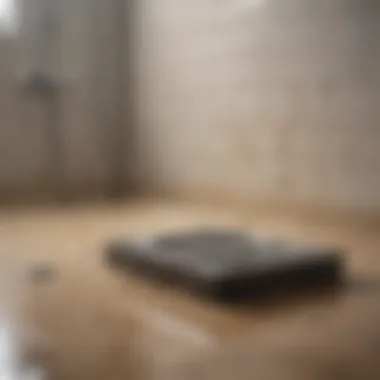
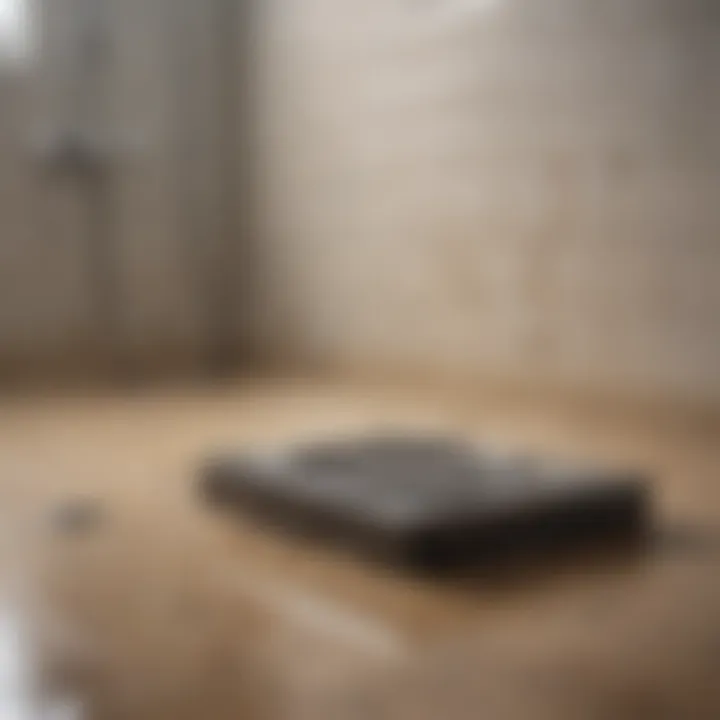
"Proactive maintenance can save homeowners significant costs and frustration over time."
When to Seek Professional Help
Even with the best natural remedies, some shower drain issues may necessitate the expertise of a professional. Recognizing the right moment to call in a plumber can save homeowners from further complications. This section delves into when it's critical to seek professional help and the benefits that come with it.
Identifying Persistent Clogs
Persistent clogs may signal deeper issues within your plumbing system. If you’ve tried various natural solutions, such as boiling water or the baking soda and vinegar method, but your shower remains blocked, a professional assessment may be required.
Consider the following indicators when determining if a clog is persistent:
- Frequent drainage problems despite treatment attempts.
- Slow draining that worsens over time.
- Multiple drains in the house experiencing clogs simultaneously.
- Unpleasant odors, which could imply a more serious blockage or sewer issue.
Ignoring these signs may lead to more extensive damage, requiring costly repairs. Professional plumbers can provide diagnostics, ensuring that the root cause is addressed rather than merely treating symptoms.
Signs of Serious Plumbing Issues
Some signs warrant immediate professional intervention due to the potential for serious plumbing issues. These might not only affect your shower drain but could also indicate larger problems in your home’s plumbing system. Here are some of the most common signs:
- Water backflow: If water comes back up after you have unclogged it, this could indicate a severe blockage.
- Frequent plumbing problems: If you're facing regular and recurring issues across different areas of your home.
- Gurgling noises: Unusual sounds from your drains may point to air trapped in the plumbing.
- Leaking pipes: If you notice any leaks, which may suggest failing pipes or seals, a professional should conduct an evaluation.
If these signs are observed, it’s essential to act quickly. Waiting may worsen the situation, resulting in flooding or damage to your home’s structure.
"Proactive maintenance and prompt action on plumbing issues can save substantial costs in the long run."
Recognizing when to seek professional assistance is a vital skill for homeowners. While many clogging issues can be handled with natural remedies, understanding your limits is crucial for maintaining your home’s plumbing integrity.
Cost Comparison: Natural Remedies vs. Professional Services
In this section, we will explore the financial aspects of unclogging shower drains through natural remedies compared to hiring professional plumbing services. Understanding the cost implications is crucial for homeowners. It allows them to make informed decisions based on their budget and the severity of the clog. Natural solutions usually have lower direct costs and often use household items. On the other hand, professional services come with higher expenses but can be justified by the expertise and guarantees they provide. This comparison aims to provide clarity on both options and assist homeowners in deciding what best suits their needs.
Analyzing Costs of Natural Solutions
Natural remedies can be extremely economical. Common ingredients like baking soda, vinegar, and boiling water are often readily available in most homes. Here are some relevant costs associated with these remedies:
- Baking Soda: Typically costs around $1-2 per box.
- Vinegar: A gallon might be purchased for about $3-4.
- Salt: Common table salt costs approximately $2-3 per box.
- Dish Soap: A bottle can range from $3-7.
Overall, the financial outlay for these natural solutions is quite small. The main investment is time and effort rather than money. Additionally, they are environmentally friendly, thus lessening potential long-term environmental costs.
Evaluating the Expense of Hiring Professionals
In contrast, hiring a plumber can incur significant costs. The expense often includes:
- Service Call Fee: Many plumbers charge between $50-100 just to evaluate the issue.
- Hourly Rate: The average plumber charges around $75-150 per hour.
- Parts and Materials: If special parts are needed, these can add to the total cost.
Consequently, total expenses for professional plumbing services can range from $100 to several hundred dollars, depending on the job complexity and local market rates. While professional services ensure a thorough resolution of the problem, the financial burden can be considerable.
In summary, while natural solutions provide an affordable and eco-friendly alternative to drain cleaning, engaging professionals ensures expert care. Ultimately, the choice comes down to the specific circumstances and preferences of the homeowner.
Ending
The conclusion of this article emphasizes the importance of adopting natural solutions for unclogging shower drains. Many homeowners tend to default to harsh chemicals for resolving drain issues, which can have adverse effects on both plumbing systems and the environment. Through this guide, readers discover that effective and eco-friendly methods exist, reducing reliance on these harmful substances.
Recap of Effective Natural Solutions
Here, it is essential to summarize the various methods covered in the earlier sections:
- Boiling Water Technique: Simple yet effective, pouring boiling water can break down minor clogs caused by soap and hair products.
- Baking Soda and Vinegar Method: A potent combination that not only unclogs but also deodorizes the drain. This method relies on the chemical reaction between baking soda and vinegar to dislodge blockages.
- Salt and Baking Soda Combination: This method uses salt's abrasive qualities to complement baking soda's cleaning power, making it a solid choice for regular maintenance.
- Dish Soap: Using a few drops of dish soap with hot water can also lubricate and aid in the breakdown of greases or soap scum.
- Manual Removal Techniques: In cases where the clog is severe, physically removing debris might be necessary. This approach, while labor-intensive, helps maintain the integrity of plumbing without chemicals.
Encouraging Proactive Maintenance Strategies
Consistent maintenance is the cornerstone of preventing future clogs. Homeowners should consider the following strategies:
- Regular Cleaning Routines: Set a schedule for cleaning drains to keep hair and soap remnants at bay. Cleaning weekly with hot water or baking soda can be very helpful.
- Using Drain Covers and Screens: Installing and regularly cleaning drain covers can prevent debris from entering the drainage system, minimizing the chance of clogs.
- Monitoring Hair and Soap Build-up: Pay attention to the amount of hair and soap residue. Regularly addressing excessive build-up can help keep drains flowing freely.
By summarizing these effective remedies and emphasizing maintenance strategies, homeowners can maintain their shower drains more effectively and naturally.



